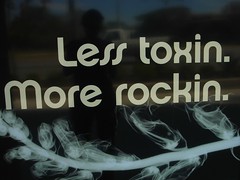- in Health & Beauty by Alexis Rodrigo
- |
- 3 comments
Household Toxins and Autism
The rise in autism cases has many people concerned, especially as a definite cause for the disorder is elusive. The Centers for Disease Control reports that 1 in 150 children (more boys than girls) born today will develop autism. The rise in autism since the early 1990s is epidemic in proportion, but thankfully, there are some insights as to what triggers this disorder.
Toxins in general are implicated in autism, and now environmental factors are coming under scrutiny. Specifically, household items such as cleaners are potential culprits.
In the Womb
A recent study analyzed the blood and urine of nine women across several states who were in their second trimesters of pregnancy. The study revealed 13 toxins present in the systems of these women, including Bisphenol A (BPA), perfluorinated compounds, mercury, and phthalates. What are these toxins, and where are they found?
* BPAs are used in the manufacture of polycarbonate plastic and food can lining. It acts as an artificial form of estrogen in the body, and its potential to adversely affect fetal development is documented. BPAs wreak hormonal havoc in adults’ bodies as well, decreasing the production of sperm in males and causing changes in behavior.
* Perfluorinated compounds are used to make non-stick cookware and stain-resistant products, such as you might have had sprayed on your furniture or carpet. Perfluorinated compounds are a potential carcinogen in people and cause tumors in laboratory animals. It is not too much of a stretch to consider that these compounds could affect brain development.
* Mercury is known to affect brain development and to harm cognitive function. Every woman in the above study had mercury in her blood. Household items that contain mercury include household batteries, fluorescent lights, thermometers, paint residues, and thermostats.
* Phthalates are implicated in reproductive problems and asthma, and interestingly, asthma and autism often occur together. Pthalates are fragrance carriers and are used in shampoos, cosmetics, and other beauty products.
Of course, exposure to these common toxins does not cease after birth. The poisoning may begin then, but it continues as the baby grows up in a household where such items are common.
Other Toxins
* Pet shampoos have been found to be used twice as often in families with autistic children. Pet shampoos contain organophosphates or pyrethroids.
* Antibacterial soaps contain ingredients that may affect the human immune system, and autoimmune disorders are associated with autism (the immune system turns inward and attacks the body, causing inflammation and other symptoms).
* Pesticides have known neurological effects and are found on everything from produce to lawns.
* Household cleaners emit vapors that are known to be toxic, to the point that some doctors warn their pregnant patients not to use them to clean the house during pregnancy. These cleaners – festooned with “Keep Out of the Reach of Children” warnings – contain carcinogens, neurotoxins, and endocrine disrupters (which means they can affect human hormones).
Perhaps if we began to take those warnings seriously and kept such products completely out of our homes, we could lower our children’s risk for developing autism.
If you liked this post, submit your email address below to get new posts by email:

